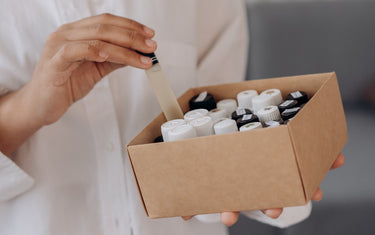4 min read / 29 July 2023 / Laura Garvin Gomez
How to Store Fragrance Oils
Learn the best practices for storing fragrance oils in our helpful guide.
Share this post

The aromatic delights of fragrance oils can make all the difference when it comes to finding time to relax at home.
And learning how to store fragrance oils will help you to get more out of them every time you open a bottle.
When it comes to fragrance oil storage, there are some important points to cover that go hand-in-hand with how you use them. Here we talk about the best way to store your oils so they can last for as long as possible.
How to store fragrance oils
Read through the guidelines below on how to store fragrance oils, which will help you maximise their shelf life and keep you safe.
Buy from a reputable seller
The quality and safety of your fragrance oils begins with the supplier. Buying from a reputable seller will go a long way to ensuring you will be using fragrance oils that meet quality and safety standards within the industry, so you are not creating any additional risk for yourself. Even if it means paying a little more than usual or going above your budget, it should ensure you have a better overall experience.

Use dark bottles
Dark, cobalt, and amber glass bottles are the best kinds to use for storing your fragrance oils. Like how you’ll see cooking olive oil sold in dark bottles, they are designed to protect the oil against UV rays and heat sources. The dark glass helps to keep the oil cool and shaded, so the composition and effectiveness of the oil remains stronger for longer.
Store in a dry, cool area
As we mention above, the best place to keep your fragrance oils is in a cool, dry, dark place in your home. It can be a cupboard, shelf or drawer – anywhere that keeps the oils away from direct sunlight and indoor heat sources. You can also use the fridge to store your fragrance oils, as this keeps them in a cool, dark place with a consistent temperature. Take the oil out of the fridge 1-2 hours before application and it should be warm enough to use.
Transfer half full bottles
Over time, the liquid level of the oils will start to lower as you continue to use it. However, this can pose a problem as it allows the oxygen living in the bottle to slowly oxidise the oil, which will eventually harm its aromatic properties, causing it to foul and expire. A helpful tip is to transfer the oil to a smaller bottle to reduce the oxygen ‘headspace’ between the top of the oil and cap. For example, if you are halfway through a 250ml bottle, consider transferring it to a 125ml bottle so the oil is more compact.

Always replace the cap
Another key point to remember is to replace the lid of the bottle every time you use it. Oxidation is a common issue with fragrance oils, but you can safeguard against it by putting the lid on, even if you are putting the bottle down momentarily as you apply it. Over exposure to oxygen will eventually lead to the changing of the oil’s composition, which shortens its shelf life.
Keep the oil clean
Try to avoid allowing unsterilised items like cotton balls or your own fingers to come into contact with the oil in the bottle. Instead, pour the amount you need or measure it into a container and work with the oil from there. This will maintain the integrity of the oil, so it remains as pure as possible before application.
Keep away from children and pets
Fragrance oils and essential oils should always be kept out of the reach of children and pets. These types of oils are highly concentrated and unsupervised exposure could cause serious harm. Due to their sensitivity, young children and pets can experience strong allergic reactions when touching fragrance oils, so be sure to store them in a place that is not easy to access.
Keep track of the dates
A method of keeping track of an oil’s expiry window is to write the opening date on the oil label. Most fragrance oils will last between 1-2 years, although this is influenced by how they are stored and used, which means they can sometimes expire sooner or occasionally last for a little longer.

If you already have experience with essential oils, then learning how to store fragrance oils should be straightforward, as many of the same rules apply. As long as they are kept in a cool, dry and dark location they should last as expected and allow you to enjoy them for as long as you need. Try to minimise their exposure to oxygen as much as possible and only purchase from sellers you know you can trust.










